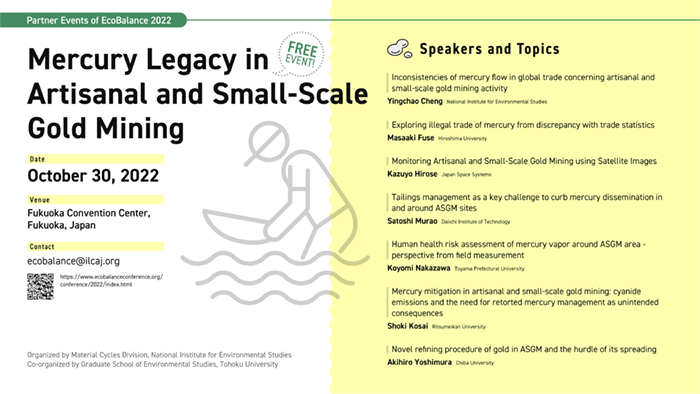
Partner events
- Mercury Legacy in Artisanal and Small-Scale Gold Mining
- Critical minerals for carbon-neutrality and circular economy
- GLAM, GLAD and the road towards global harmonization and interoperability of LCA
Mercury Legacy in Artisanal and Small-Scale Gold Mining
| Date&Time : | October 30, 2022 13:30-16:30 (Japan Standard Time (UTC +9)) |
|---|---|
| Venue : | Fukuoka Convention Center (Fukuoka, Japan) + Online (Zoom) |
| Registration fee : | Free |
Note: Onsite participation to this event is only for the invited speakers. Participation of general registrants is only via Zoom webinar (the link for participation will be sent later in advance to the event).
Outline
Artisanal and small-scale gold mining (ASGM), or gold mining by low-income families or small enterprises, is widespread across the globe. It is estimated that over 25 million people, including women and children, are involved with ASGM in more than 50 countries. Despite the small-scale activity of any individual ASGM site, each site is significantly important to its local economy and collectively, to the global economy. Nonetheless, ASGM has been the biggest contributor to global mercury emissions. Mercury is a toxic element that has numerous wide-ranging deleterious effects on humans, biota, and the environment. In response to the global issues associated with mercury, the Minamata Convention on Mercury entered into force on the 16th of August, 2017 to solve the mercury problem.
However, there are still many issues in ASGM that should be addressed. This would include site detection using geological information and remote sensing, detection of the informal flow of mercury from global trade to the ASGM sector, illegal trading of mercury between countries despite the phasing out of mercury, risk assessment of mercury contamination from ASGM, and identification of unintended consequences of mercury mitigation. To achieve sound mercury management in ASGM, this side event aims at providing the grounds for researchers to collaborate on decreasing the use, the flow, and the emissions from mercury in the ASGM sector.

Critical minerals for carbon-neutrality and circular economy
| Date&Time : | November 3, 2022 13:30-16:30 (Japan Standard Time (UTC +9)) |
|---|---|
| Venue : | Fukuoka International Congress Center (Fukuoka, Japan) + Online (Zoom) |
| Registration fee : | Free |
Outline
Critical minerals, such as rare earths, cobalt, lithium, nickel, copper, and aluminium, are used for advanced applications, which related to renewable energy and generally face supply risks and vulnerability of the supply chain because of minor and biased occurrence in the world. Therefore, maintaining a circular flow of the critical minerals is expected to achieve a circular economy and sometimes national security.
This event, as a support event of EcoBalance 2022, provides the latest related research, standardization and rulemaking situation about a criticality assessment, traceability system for carbon footprint, and established value networks.
GLAM, GLAD and the road towards global harmonization and interoperability of LCA
| Date&Time : | November 3, 2022 15:00-17:30 (Japan Standard Time (UTC +9)) |
|---|---|
| Venue : | Fukuoka International Congress Center (Fukuoka, Japan) + Online (Zoom) |
| Registration fee : | Free |
Outline
The Global Guidance for Life Cycle Assessment Indicators and Methods (GLAM) focuses on establishing a comprehensive, consistent, and global Environmental Life Cycle Impact Assessment (LCIA) method, covering classification, midpoint and damage characterization, normalization, and weighting to assess the life cycle impacts of products and services on human health, ecosystems, and natural resources. The Global LCA Data Access Network (GLAD) is the largest directory of LCA datasets that helps users find the LCA datasets they need and aims to increase the interoperability between independent LCA database providers. Both initiatives operate under the umbrella of the Life Cycle Initiative and continue efforts to harmonize the methodologies of LCA globally. However, despite the work accomplished so far, there is still a long way to reach a state where bidirectional interoperability is ensured between multiple LCA databases evaluated by a single impact assessment method, with numerous LCA software producing identical (or permissible) results. In other words, the LCA community still has many issues to solve before generating reasonable impact assessment result comparisons across multiple LCA databases.
In this workshop, we will introduce the recent activities of GLAM and GLAD. We will also discuss the challenges needed to harmonize LCA impact assessment results at the global level and the GLAM x GLAD interaction required for the next steps.
